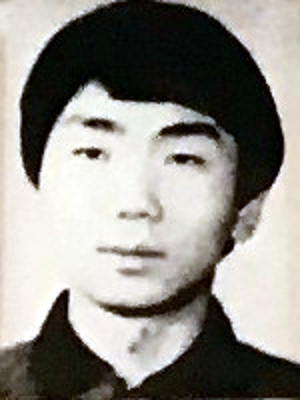Male, 24, a worker at the Beijing People’s Medical Publishing House. From: Beijing.
Du was described as a passionate youth. He went to Tiananmen Square often to support the students during the 1989 Democracy Movement. On June 3, 1989, around midnight, Du and one of his classmates biked along Chang’an Avenue heading west. Near Xinhuamen, they heard gunshots coming from martial law troops nearby who were firing as they moved eastward. As Du and his classmate were about to turn back, Du was shot in the temple and collapsed over his bicycle. Du was among six victims who were taken by a public bus to Xiehe Hospital (also known as Peking Union Medical College Hospital) and among four who died on the way.
Du’s family looked for him through the night, and found his body at Xiehe Hospital in the early morning of June 4. At the hospital, his family members saw stacks of corpses in the morgue and specimen room. Later they also saw three albums compiled by the hospital displaying photos of dead bodies in the hospital: Two of the albums were full, each holding 40 photos. Du was victim number 30.
Du was one of four children in his family. His father died when Du was 15. At that time, Du had to quit school to start working, taking on the job left by his father to lessen the burden on his mother. He was said to be an honest person and a very diligent worker.
Du’s mother Ge Guirong (葛桂荣) is a member of the Tiananmen Mothers.

I am the mother of June Fourth victim Du Guangxue. I am now 75 years old. The 3rd of June, 20 years ago, was a day I will remember for the rest of my life. On this day, I lost my son. And for the past 20 years, I have not stopped missing him for a single day. As time passes and I age, my longing for him only intensifies.
For 20 years, I have lived my life in regret and self-blame. I especially loathe myself for not stopping him when he went out. I had always thought, as a veteran member of the Party who had been educated by the Party for decades, that I would never believe our Party would order the army, fed and raised by the people, to use violence against the people, especially ones who were unarmed and defenseless.
Du Guangxue knew our family was not well-off, so he worked extra hard at the factory, often working overtime to earn extra cash. Everyone, from his superiors to his peers, had a very high opinion of him. In those days, I always thought about him getting married in a few years, having a child that I would help raise, and that when he grew up and I became older, we would live happily, albeit quietly and with moderate means.
All along, I had thought that our government was one that would bravely admit its mistakes and shoulder its responsibilities. Yet, in a society that frequently speaks of harmony and human rights, why would the government refuse to face a truth that everybody already knows, and choose to hide behind lies?
The government’s behavior is unacceptable to the families of June Fourth victims. There is no mother who can resign herself to the death of her child for reasons that are far from clear. And no mother would tolerate a history written in blood being drowned in the flow of time. I do not want to spend the rest of my life watching the perpetrator continue to violate its people’s rights and dignity in another way.